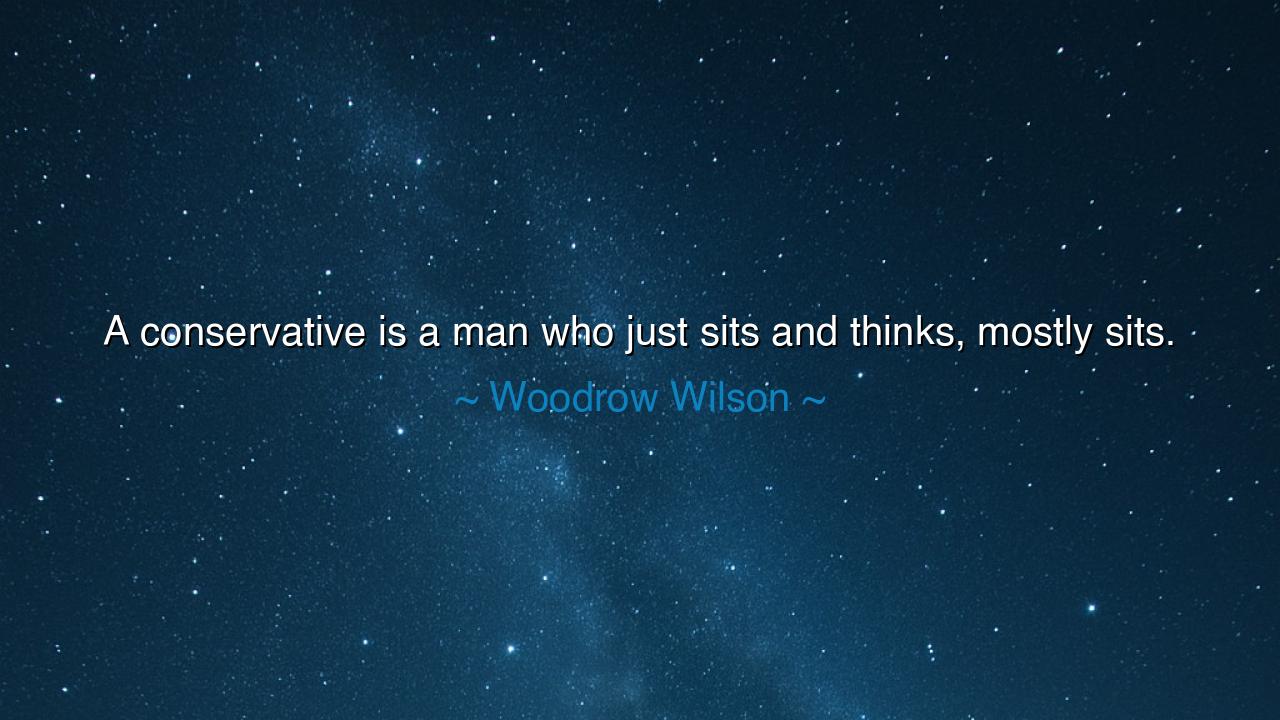
A conservative is a man who just sits and thinks, mostly sits.






The words of Woodrow Wilson, scholar and president, carry the sting of satire: “A conservative is a man who just sits and thinks, mostly sits.” With this saying, he does not condemn thought, but mocks the danger of inaction disguised as reflection. For what use is the mind if it never bears fruit in deeds? To Wilson, the true failing of the conservative was not caution itself, but the tendency to sit so long in caution that the moment for action passed.
The ancients spoke much of this balance between thought and action. Aristotle taught that contemplation is noble, but it must be joined with practice, for virtue exists only when acted upon. Likewise, generals of old knew that no battle was ever won by sitting in tents drafting endless strategies. To “sit and think” may be wise for a time, but to sit without rising is to surrender. Wilson’s words echo this eternal truth: wisdom without courage is paralysis.
Consider the debates of Wilson’s own age. When the world was torn by World War I, many sought to wait, to reflect, to hold back. Yet Wilson, though cautious by nature, eventually declared that America could not sit forever while the world burned. Action was demanded. His remark about conservatives reflected his frustration with those who mistook inaction for prudence, and delay for wisdom.
His saying is also a warning to every generation. There will always be voices that preach hesitation, that argue the world is not ready, that counsel endless sitting while dangers grow. While reflection is vital, Wilson reminds us that history punishes those who sit too long. The world is shaped by those who rise.
Let the generations remember: true thought must give birth to action, else it becomes vanity. The wise ruler, the noble citizen, is not the one who only sits and thinks, but the one who rises when the time is right, who turns reflection into decision, and decision into deed. For to sit endlessly is to yield the future to others, but to rise with purpose is to shape destiny itself.






TTMai Trang Tran
Is Wilson's portrayal of conservatives as passive thinkers fair? It’s true that some conservative ideologies may focus on slow, deliberate changes rather than quick, sweeping reforms. However, doesn’t this reflect a careful approach rather than a lack of action? Shouldn't we consider that often, conservatives prefer to maintain existing structures because they believe these foundations are what allow society to function smoothly? Isn't there a form of action in upholding stability?
TTThanh Thao
Wilson’s statement feels a bit dismissive of conservatives, implying that they are passive and avoid taking action. However, could this be an oversimplification of a complex political ideology? While conservatives may be more focused on preserving tradition and values, this doesn’t necessarily equate to inaction. Maybe the quote overlooks the role of careful planning and restraint in conservative policymaking. Can thoughtful deliberation ever be seen as active participation in change?
DQLuu Do Quyen
Wilson's quote reflects the belief that conservatives are often too hesitant to embrace change, preferring to stay with what they know. But this could be seen as an oversimplification. In reality, many conservatives are driven by a desire to preserve values and institutions that they believe are fundamental to society's stability. Is there wisdom in this approach? How do we balance progress with the desire to maintain tradition and avoid unintended consequences?
PHPham Huyen
This quote seems to mock conservatives as being overly contemplative, suggesting that they prefer to avoid action. But is that a fair critique of conservative thought? Maybe there is value in pausing and reflecting, especially in a political climate where rash decisions often cause more harm than good. Shouldn’t we recognize that some of the most impactful conservative policies might come from careful, thoughtful deliberation, rather than hasty action?
NMNhat Minh
Wilson’s quote almost humorously captures the essence of a stereotype about conservatives, portraying them as passive thinkers rather than active participants in societal change. However, is this a little too harsh? Conservatives might argue that their approach is grounded in tradition, caution, and a belief that actions should be well thought out. Could it be that they value stability, which is sometimes misunderstood as inactivity or stagnation?